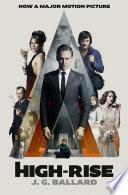Quotes from book
High-Rise

High-Rise is a 1975 novel by British writer J. G. Ballard. The story describes the disintegration of a luxury high-rise building as its affluent residents gradually descend into violent chaos. As with Ballard's previous novels Crash and Concrete Island , High-Rise inquires into the ways in which modern social and technological landscapes could alter the human psyche in provocative and hitherto unexplored ways. It was adapted into a film of the same name, in 2015, by director Ben Wheatley.
“Let the psychotics take over. They alone understood what was happening.”
Source: High-Rise (1975), Ch. 15
Source: High-Rise (1975), Ch. 3
Context: The more arid and effectless life became in the high-rise, the greater the possibilities it offered. By its very efficiency, the high-rise took over the task of maintaining the social structure that supported them all. For the first time it removed the need to repress every kind of anti-social behaviour, and left them free to explore any deviant or wayward impulses. It was precisely in these areas that the most important and most interesting aspect of their lives would take place. Secure within the shell of the high-rise, like passengers on board an automatically piloted airliner, they were free to behave in any way they wished, explore the darkest corners they could find. In many ways, the high-rise was a model of all that technology had done to make possible the expression of a truly 'free' psychopathology.
“By the logic of the high-rise those most innocent of any offence became the most guilty”
Source: High-Rise (1975), Ch. 13
Context: The untruth of the accusation, which they all knew well, only served to reinforce it... By the logic of the high-rise those most innocent of any offence became the most guilty.
“Perhaps they resent never having had a chance to become perverse”
Source: High-Rise (1975), Ch. 11
Context: It's a mistake to imagine now we're all moving towards a state of happy primitivism. The model here seems to be less the noble savage than our un-innocent post-Freudian selves, outraged by all that over-indulgent toilet-training, dedicated breast-feeding and parental affection – obviously a more dangerous mix than anything our Victorian forebears had to cope with. Our neighbours had happy childhoods to a man and still feel angry. Perhaps they resent never having had a chance to become perverse.
“In the future, violence would clearly become a valuable form of social cement.”
Source: High-Rise (1975), Ch. 8
Source: High-Rise (1975), Ch. 3
Context: A new social type was being created by the apartment building, a cool, unemotional personality impervious to the psychological pressures of high-rise life, with minimal needs for privacy, who thrived like an advanced species of machine in the neutral atmosphere... [They] were people who were content with their lives in the high-rise, who felt no personal objection to an impersonal steel and concrete landscape, no qualms about the invasion of their privacy by government agencies and data-processing organizations, and if anything welcomed these invisible intrusions, using them for their own purposes. These people were the first to master a new type of late twentieth-century life, they thrived on the rapid turnover of acquaintances, the lack of involvement with others, and the total self-sufficiency of lives which, needing nothing, were never disappointed.